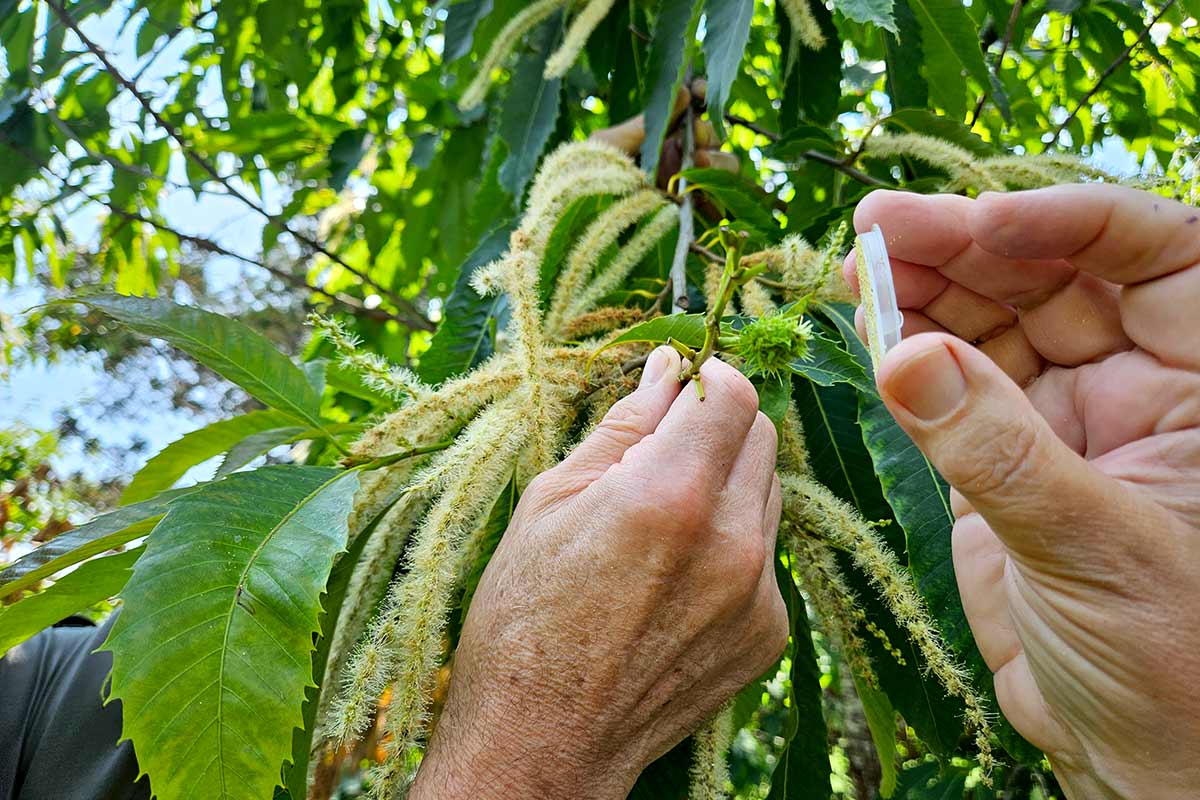Biotechnology
Using Biotechnology to Restore the American Chestnut
The once-plentiful American chestnut tree (Castanea dentata) was pushed to near extinction by two deadly diseases, chestnut blight and Phytophthora root rot (PRR), that were accidentally imported from Asia more than a hundred years ago.
The primary goal of The American Chestnut Foundation (TACF) is to restore the American chestnut tree to its native range, which requires improving its disease resistance. To carry out this groundbreaking rescue mission, TACF has developed a comprehensive science program, reviewed by external panels of experts, that combines several strategies, including breeding and biotechnology.
What is biotechnology?
In general, biotechnology (or biotech) involves using laboratory techniques to manipulate organisms at the molecular or cellular level to answer questions or solve problems. These technologies can include genomics (the study of an organism’s complete set of genes), and genetic engineering (adding, editing, or deleting genes). As breeding methods advance, the line between biotech and breeding becomes blurred, and TACF’s breeding program is already employing biotech through its use of genomics. While biotech approaches may face significant hurdles, such as federal regulatory approval, they also have the potential of high rewards for forest health recovery.
TACF and Biotechnology
TACF and its partners have used biotechnology to
- Study the genetic diversity of American chestnut populations
- Identify regions of the Chinese and American chestnut genomes that are associated with disease resistance or susceptibility
- Generate lists of specific candidate genes, particularly from the Chinese chestnut tree, Castanea mollissima, that may be associated with disease resistance.
This knowledge could enable us to make more informed breeding choices than we can using traditional breeding, which relies on random genetic recombination. Ultimately biotechnology could be used to make genetically modified American chestnut trees that have high levels of heritable disease resistance.

Ongoing Biotech Projects
Identifying mechanisms of chestnut blight virulence
TACF research partners are using biotechnology to identify genes in the chestnut blight fungus responsible for virulence (harmfulness to chestnut). This knowledge can improve our understanding of how the fungus interacts with and colonizes chestnuts trees, and how this differs between resistant Chinese chestnuts and susceptible American chestnuts. It could even be used to develop modified American chestnuts capable of shutting down key fungal virulence genes.
Inducible OxO transgenic lines
Insertion of a gene from wheat called oxalate oxidase, or OxO, may have the potential to increase blight tolerance in American chestnut. This is the same gene used in the Darling 54 chestnut that TACF supported until December 2023 (see the Darling 58 page and the Darling 58 Performance page). Expressing this gene with inducible promoters, that confine its activity to only blight-infected tissue, has the potential to reduce the growth and survival penalties we observed in Darling 54. Our collaborators at the University of Georgia are developing founders (young plants) with a blight-inducible OxO gene and a spectrum of expression strengths. In the next few years, we will conduct field trials and laboratory experiments to assess the performance of these inducible OxO lines.
Cisgenics: inserting resistance genes from other chestnut species
Another potential pathway is to insert genes from Chinese chestnut directly into American chestnut. TACF has made substantial progress in identifying candidate genes from Chinese chestnut that may contribute to blight resistance. We are collaborating with researchers from Virginia Tech to validate whether these genes play a role in blight resistance.
How You Can Help
Biotechnology shows great promise for restoring imperiled species and improving forest health. TACF supports a variety of researchers and institutions who are working toward this important goal, but we can’t do it without your help!
We are deeply grateful to TACF’s volunteers, partners, donors, and members for supporting this ambitious mission and the next chapter of our work. If you’d like to be part of this historic effort, please consider becoming a member and volunteering with your local chapter or donating to support the mission. Thank you!

